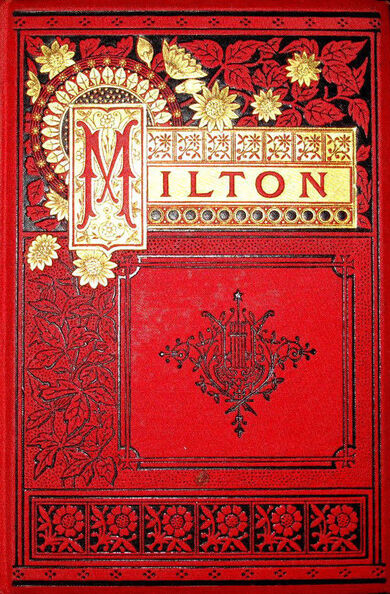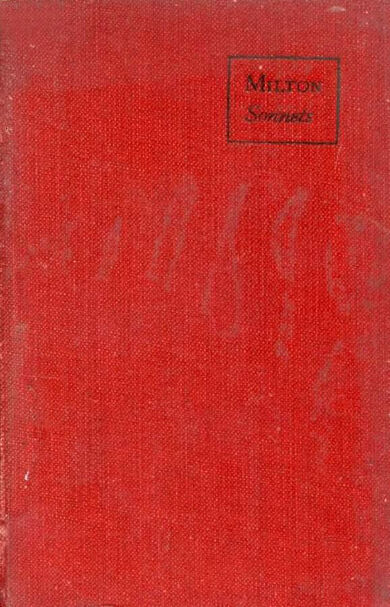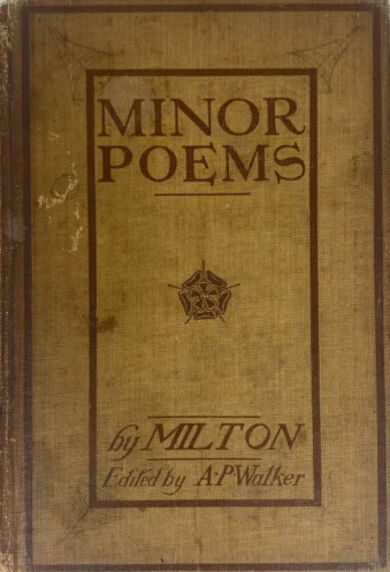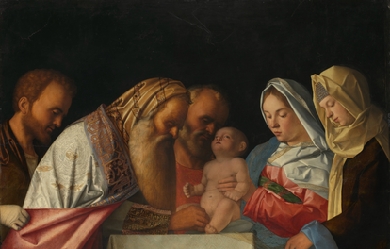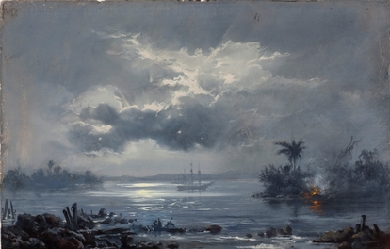Samson Agonistes
Samson. A little onward lend thy guiding hand
To these dark steps, a little further on;
For yonder bank hath choice of sun or shade.
There I am wont to sit, when any chance
Relieves me from my task of servile toil,
Daily in the common prison else enjoined me,
Where I, a prisoner chained, scarce freely draw
The air, imprisoned also, close and damp,
Unwholesome draught. But here I feel amends—
The breath of Heaven fresh blowing, pure and sweet,
With day-spring born; here leave me to respire.
This day a solemn feast the people hold
To Dagon, their sea-idol, and forbid
Laborious works. Unwillingly this rest
Their superstition yields me; hence, with leave
Retiring from the popular noise, I seek
This unfrequented place to find some ease—
Ease to the body some, none to the mind
From restless thoughts, that, like a deadly swarm
Of hornets armed, no sooner found alone
But rush upon me thronging, and present
Times past, what once I was, and what am now.
Oh, wherefore was my birth from Heaven foretold
Twice by an Angel, who at last, in sight
Of both my parents, all in flames ascended
From off the altar where an offering burned,
As in a fiery column charioting
His godlike presence, and from some great act
Or benefit revealed to Abraham’s race?
Why was my breeding ordered and prescribed
As of a person separate to God,
Designed for great exploits, if I must die
Betrayed, captived, and both my eyes put out,
Made of my enemies the scorn and gaze,
To grind in brazen fetters under task
With this heaven-gifted strength? O glorious strength,
Put to the labour of a beast, debased
Lower than bond-slave! Promise was that I
Should Israel from Philistian yoke deliver!
Ask for this great Deliverer now, and find him
Eyeless in Gaza, at the mill with slaves,
Himself in bonds under Philistian yoke.
Yet stay; let me not rashly call in doubt
Divine prediction. What if all foretold
Had been fulfilled but through mine own default?
Whom have I to complain of but myself,
Who this high gift of strength committed to me,
In what part lodged, how easily bereft me,
Under the seal of silence could not keep,
But weakly to a woman must reveal it,
O’ercome with importunity and tears?
O impotence of mind in body strong!
But what is strength without a double share
Of wisdom? Vast, unwieldly, burdensome,
Proudly secure, yet liable to fall
By weakest subtleties; not made to rule,
But to subserve where wisdom bears command.
God, when he gave me strength, to shew withal
How slight the gift was, hung it in my hair.
But peace! I must not quarrel with the will
Of highest dispensation, which herein
Haply had ends above my reach to know.
Suffices that to me strength is my bane,
And proves the source of all my miseries—
So many, and so huge, that each apart
Would ask a life to wail. But, chief of all,
O loss of sight, of thee I most complain!
Blind among enemies! O worse than chains,
Dungeon, or beggary, or decrepit age!
Light, the prime work of God, to me is extinct,
And all her various objects of delight
Annulled, which might in part my grief have eased.
Inferior to the vilest now become
Of man or worm, the vilest here excel me:
They creep, yet see; I, dark in light, exposed
To daily fraud, contempt, abuse and wrong,
Within doors, or without, still as a fool,
In power of others, never in my own—
Scarce half I seem to live, dead more than half.
O dark, dark, dark, amid the blaze of noon,
Irrecoverábly dark, total eclipse
Without all hope of day!
O first-created Beam, and thou great Word,
“Let there be light, and light was over all,”
Why am I thus bereaved thy prime decree?
The Sun to me is dark
And silent as the Moon,
When she deserts the night,
Hid in her vacant interlunar cave.
Since light so necessary is to life,
And almost life itself, if it be true
That light is in the soul,
She all in every part, why was the sight
To such a tender ball as the eye confined,
So obvious and so easy to be quenched,
And not, as feeling, through all parts diffused,
That she might look at will through every pore?
Then had I not been thus exiled from light,
As in the land of darkness, yet in light,
To live a life half dead, a living death,
And buried; but, O yet more miserable!
Myself my sepulchre, a moving grave;
Buried, yet not exempt,
By privilege of death and burial,
From worst of other evils, pains, and wrongs;
But made hereby obnoxious more
To all the miseries of life,
Life in captivity
Among inhuman foes.
But who are these? for with joint pace I hear
The tread of many feet steering this way;
Perhaps my enemies, who come to stare
At my affliction, and perhaps to insult—
Their daily practice to afflict me more.
Chor. This, this is he; softly a while;
Let us not break in upon him.
O change beyond report, thought, or belief!
See how he lies at random, carelessly diffused,
With languished head unpropt,
As one past hope, abandoned,
And by himself given over,
In slavish habit, ill-fitted weeds
O’er-worn and soiled.
Or do my eyes misrepresent? Can this be he,
That heroic, that renowned,
Irresistible Samson? whom, unarmed,
No strength of man, or fiercest wild beast, could withstand;
Who tore the lion as the lion tears the kid;
Ran on embattled armies clad in iron,
And, weaponless himself,
Made arms ridiculous, useless the forgery
Of brazen shield and spear, the hammered cuirass,
Chalybean-tempered steel, and frock of mail
Adamantean proof:
But safest he who stood aloof,
When insupportably his foot advanced,
In scorn of their proud arms and warlike tools,
Spurned them to death by troops. The bold Ascalonite
Fled from his lion ramp; old warriors turned
Their plated backs under his heel,
Or grovelling soiled their crested helmets in the dust.
Then with what trivial weapon came to hand,
The jaw of a dead ass, his sword of bone,
A thousand foreskins fell, the flower of Palestine,
In Ramath-lechi, famous to this day:
Then by main force pulled up, and on his shoulders bore,
The gates of Azza, post and massy bar,
Up to the hill by Hebron, seat of giants old—
No journey of a sabbath-day, and loaded so—
Like whom the Gentiles feign to bear up Heaven.
Which shall I first bewail—
Thy bondage or lost sight,
Prison within prison
Inseparably dark?
Thou art become (O worst imprisonment!)
The dungeon of thyself; thy soul
(Which men enjoying sight oft without cause complain)
Imprisoned now indeed,
In real darkness of the body dwells,
Shut up from outward light
To incorporate with gloomy night;
For inward light, alas!
Puts forth no visual beam.
O mirror of our fickle state,
Since man on earth, unparalleled,
The rarer thy example stands,
By how much from the top of wondrous glory,
Strongest of mortal men,
To lowest pitch of abject fortune thou art fallen.
For him I reckon not in high estate
Whom long descent of birth,
Or the sphere of fortune, raises;
But them whose strength, while virtue was her mate,
Might have subdued the Earth,
Universally crowned with highest praises.
Sams. I hear the sound of words; their sense the air
Dissolves unjointed ere it reach my ear.
Chor. He speaks: let us draw nigh. Matchless in might,
The glory late of Israel, now the grief!
We come, thy friends and neighbours not unknown.
From Eshtaol and Zora’s fruitful vale,
To visit or bewail thee; or, if better,
Counsel or consolation we may bring,
Salve to thy sores: apt words have power to swage
The tumours of a troubled mind,
And are as balm to festered wounds.
Sams. Your coming, friends, revives me; for I learn
Now of my own experience, not by talk,
How counterfeit a coin they are who “friends”
Bear in their superscription (of the most
I would be understood). In prosperous days
They swarm, but in adverse withdraw their head,
Not to be found, though sought. Ye see, O friends,
How many evils have enclosed me round;
Yet that which was the worst now least afflicts me,
Blindness; for, had I sight, confused with shame,
How could I once look up, or heave the head,
Who, like a foolish pilot, have shipwrecked
My Vessel trusted to me from above,
Gloriously rigged, and for a word, a tear,
Fool! have divulged the secret gift of God
To a deceitful woman? Tell me, friends,
Am I not sung and proverbed for a fool
In every street? Do they not say, “How well
Are come upon him his deserts”? Yet why?
Immeasurable strength they might behold
In me; of wisdom nothing more than mean.
This with the other should at least have paired;
These two, proportioned ill, drove me transverse.
Chor. Tax not divine disposal. Wisest men
Have erred, and by bad women been deceived;
And shall again, pretend they ne’er so wise.
Deject not, then, so overmuch thyself,
Who hast of sorrow thy full load besides.
Yet, truth to say, I oft have heard men wonder
Why thou should’st wed Philistian women rather
Than of thine own tribe fairer, or as fair,
At least of thy own nation, and as noble.
Sams. The first I saw at Timna, and she pleased
Me, not my parents, that I sought to wed
The daughter of an Infidel. They knew not
That what I motioned was of God; I knew
From intimate impulse, and therefore urged
The marriage on, that, by occasion hence,
I might begin Israel’s deliverance—
The work to which I was divinely called.
She proving false, the next I took to wife
(O that I never had! found wish too late!)
Was in the vale of Sorec, Dalila,
That specious monster, my accomplished snare.
I thought it lawful from my former act,
And the same end, still watching to oppress
Israel’s oppressors. Of what now I suffer
She was not the prime cause, but I myself,
Who, vanquished with a peal of words, (O weakness!)
Gave up my fort of silence to a woman.
Chor. In seeking just occasion to provoke
The Philistine, thy country’s enemy,
Thou never wast remiss, I bear thee witness;
Yet Israel still serves with all his sons.
Sams. That fault I take not on me, but transfer
On Israel’s governors and heads of tribes,
Who, seeing those great acts which God had done
Singly be me against their conquerors,
Acknowledged not, or not at all considered,
Deliverance offered. I, on the other side,
Used no ambition to commend my deeds;
The deeds themselves, though mute, spoke loud the doer.
But they persisted deaf, and would not seem


